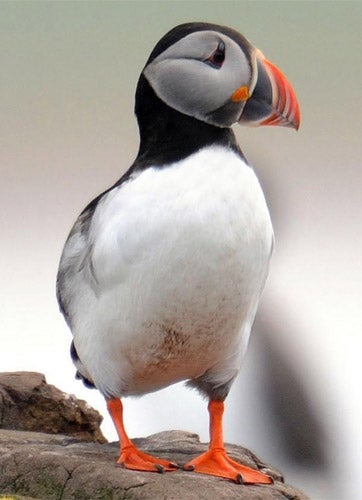Sat nav fitted to puffins in bid to halt decline
Tracking devices glued to birds as scientists try to explain slump

Puffins living in one of the most remote places in the UK are to be fitted with "sat nav" devices to help scientists discover why their numbers are falling.
This summer, researchers will use GPS technology to track the movements of a colony of puffins living on the Farne Islands, off the Northumberland coast, in a bid to explain a dramatic decline in numbers over the past five years.
The distinctive black and white birds will be tagged with GPS transmitters in order to shed new light on puffin movement and behaviour, researchers from Newcastle University said.
The tags, which are glued on to the birds' feathers and fall off after several days, will map their movements to find out where they go to find fish, how they get there and what they do once they arrive.
A survey of the breeding pairs of puffins carried out on eight of the Farne Islands in the summer of 2008 found that numbers were down by one-third compared with the previous survey in 2003 – the puffin population dropped from 55,674 to 36,500 in five years.
Researchers from Newcastle University are working with National Trust wardens on remote Brownsman Island to tag and ring the puffins before fitting them with the GPS devices.
The puffins will also be weighed and measured to make sure that the tags do not affect their feeding habits.
In addition, the puffins will be fitted with small time-depth recorders, which will help scientists find out more about the way that puffins dive in search of food.
The recorders will give detailed information about how often and how deeply they dive, and at what sea temperatures – helping to explain how puffins might be affected by climate change and possible changes in sea temperatures.
David Steel, the National Trust head warden on the Farne Islands, said: "This has become the case of the disappearing puffins. Young puffins are successfully fledging each year and it would seem that their staple food, the sand eel, is in good supply but they're just not coming back to the islands. This research, including further counts, is designed to shed some light on what is happening."
Dr Richard Bevan, from Newcastle University, said: "Technological developments now mean that we're getting closer to finding the pieces of the jigsaw to help solve the puffin puzzle.
"The new data will help explain what the puffins are doing when they're on the Farne Islands and hopefully then help us to understand why numbers have declined so dramatically."
Join our commenting forum
Join thought-provoking conversations, follow other Independent readers and see their replies
Comments
Bookmark popover
Removed from bookmarks